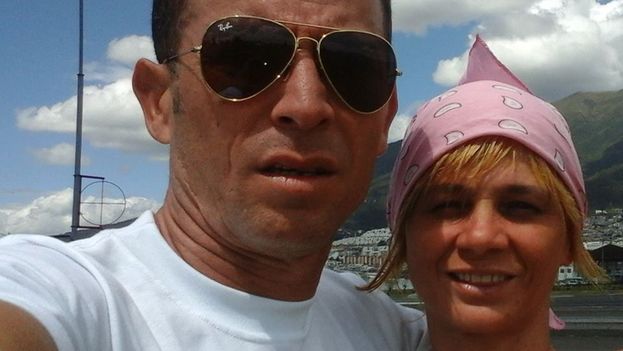
![]() 14ymedio, Mario Penton, Miami, 31 May 2016 – Colombian immigration officials arrested Maidelin Hernandez and her husband, Nelson March on Monday night; the couple documented the daily situation of hundreds of Cubans who are stranded in a shelter in the Colombian city of Turbo.
14ymedio, Mario Penton, Miami, 31 May 2016 – Colombian immigration officials arrested Maidelin Hernandez and her husband, Nelson March on Monday night; the couple documented the daily situation of hundreds of Cubans who are stranded in a shelter in the Colombian city of Turbo.
The couple was reportedly deported to Ecuador, according to William Gonzalez de la Hoz, Ombudsman, despite the fact that Hernandez has cancer and wants to reach the United States so that his family can pay for treatment.
“This is a sign. Slowly they continue to deport small groups so as not to cause a scandal,” said a Colombian official who requested anonymity.
Turbo’s mayor, Alejandro Abuchar, confirmed that the Cubans had been arrested, but the mayor says he has no tied to the Colombian immigration authorities. “We continue making every effort for migrants, trying to ensure that their rights as human beings are respected,” said the mayor.
The deportation of this couple happens after last Sunday’s repatriation to to Cuba of an undocumented immigrant couple, who were arrested near Medellin.
“That was very unjust, we are all in the shelter or homes, according to what each person is able to pay, but we thought they would make a collective decision. Now we see that is not the case,” said Aylin Gari Cruz, an activist in the Republican Party Cuba currently in Turbo.
The process of detention occurred when the couple left the hostel where more than a hundred Cubans are sleeping in this Caribbean city. According to statements by the Hernandez himself, he was brought down by an official of Colombia Migration while trying to find medication to alleviate the pain of his illness. After a quick scuffle, they were arrested and forbidden to communicate with family and friends, and one of their cell phones was confiscated.
Hernandez managed to hide his cellphone in his underwear and from the immigration office sent brief messages to the press on the situation they found themselves in.
In documents shared with this newspaper by Turbo’s Municipal Ombudsman Office, the migrants refused to give their names and, on being considered “undocumented,” the deportation process began.
